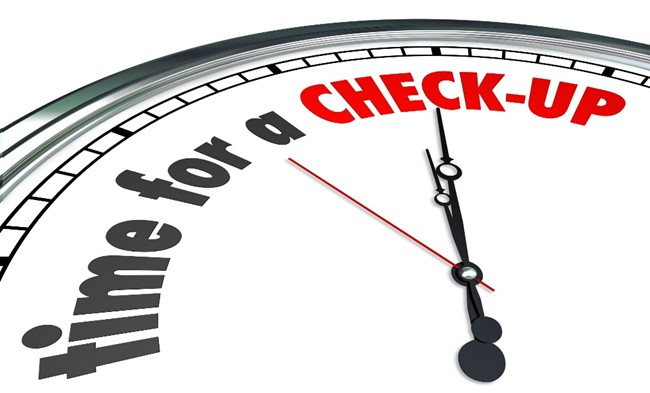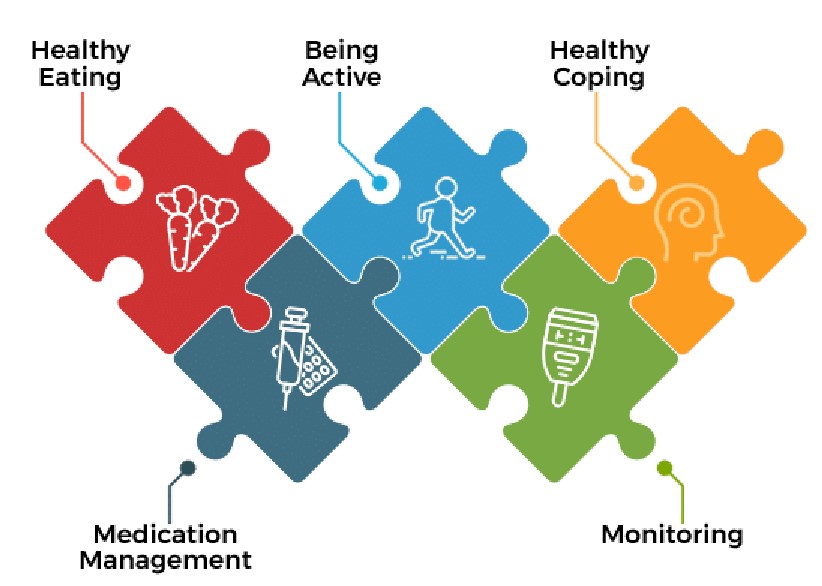
Managing Diabetes
Get these Diabetes Care Check-ups
- Check your blood sugar levels several times a day
Recommended times to check your blood sugar levels: 

- When you first wake up, before you eat or drink anything
- Before a meal
- Two hours after a meal
- At bedtime
- Get your A1c measured twice a year OR as recommended by your doctor
- Take your diabetes medicine as prescribed by your doctor
- Get your blood pressure checked at each doctor’s visit
- Get your feet checked for sores at each doctor’s visit
- If you’re having challenges meeting your treatment goals, visit your doctor every 3 months
- Get your cholesterol checked at least once a year
- Get your kidney function checked at least once a year
- Get an eye exam at least once a year
- Get a routine dental exam once a year
- Get a comprehensive periodontal exam once a year
- Get a comprehensive dental exam every 36 months
- Get at least 150 minutes a week of moderate activity
- Eat healthy foods to help your blood sugar stay in your target range
- Talk to your doctor about community resources if you are experiencing one or more social determinants of health
Source: Centers for Disease Control and Prevention - Manage Blood Sugar
Diabetes Care Activities
There is no cure for diabetes, but you can manage your diabetes by following a healthy diet, exercise regularly, quit smoking, and regular doctor visits. You can also reduce the effects of diabetes by:
- Taking your medicine as your doctor prescribed.
- Daily blood sugar monitoring via finger prick or continuous glucose monitor (without finger prick). Set alarms in your phone to help you remember to check blood sugar.
- Taking a diabetes self-management education and support class
- Keeping your health care appointments
Diabetes Self-Management Education (DSME) programs teach you how to stay healthy and manage your Diabetes. In the program you will learn the following skills:
- Eating healthy
- Being active

- Checking your blood sugar (glucose)
- Taking your medicine
- Coping with the emotional side of diabetes
- Reducing your risk of other health problems
Ask your doctor to refer you to a diabetes Self-Management Education program.
Some classes are free, some are covered by Medicare and might require a co-pay, and some have a fee. Costs may vary by type of class and provider.
Source: Centers for Disease Control and Prevention - Education and Support
Find the right Program for you!
| Programs | Diabetes Self-Management Program (DSMP) |
Programa de Manejo Personal de la Diabetes (DSMP) |
Diabetes Self-Management Education (DSME) |
|---|---|---|---|
| Purpose | An interactive program that teaches people to implement and maintain healthy Diabetes self-care behaviors to live fulfilling lives. | Un programa interactivo que enseña a las personas a implementar y mantener comportamientos saludables de autocuidado de la Diabetes para vivir una vida plena | DSME programs can teach you how to stay health and how to make what you learn part of life. People who take these classes can make better decisions about their Diabetes. This class can help you take care of your Diabetes day-to-day. |
| Course Length | 6-weeks | 6-semanas | 10-weeks |
| Target Population | People who have Type 2 Diabetes and/or caregivers who assist people with Diabetes | Personas con Diabetes Tipo 2 y/o cuidadores que ayudan a personas con Diabetes | People with Type 1 Diabetes, Type 2 Diabetes, or gestational Diabetes. Family members are welcomed! |
| Instructors | Certified instructors | Instructoras certificadas | Licensed or certified health professionals lead the classes |
| Find a Class Near You! | EBLC Programs and Workshops Maryland Department of Health - Find Classes |
EBLC Programs and Workshops Maryland Department of Health - Find Classes |
EBLC Programs and Workshops Maryland Department of Health - Find Classes |
